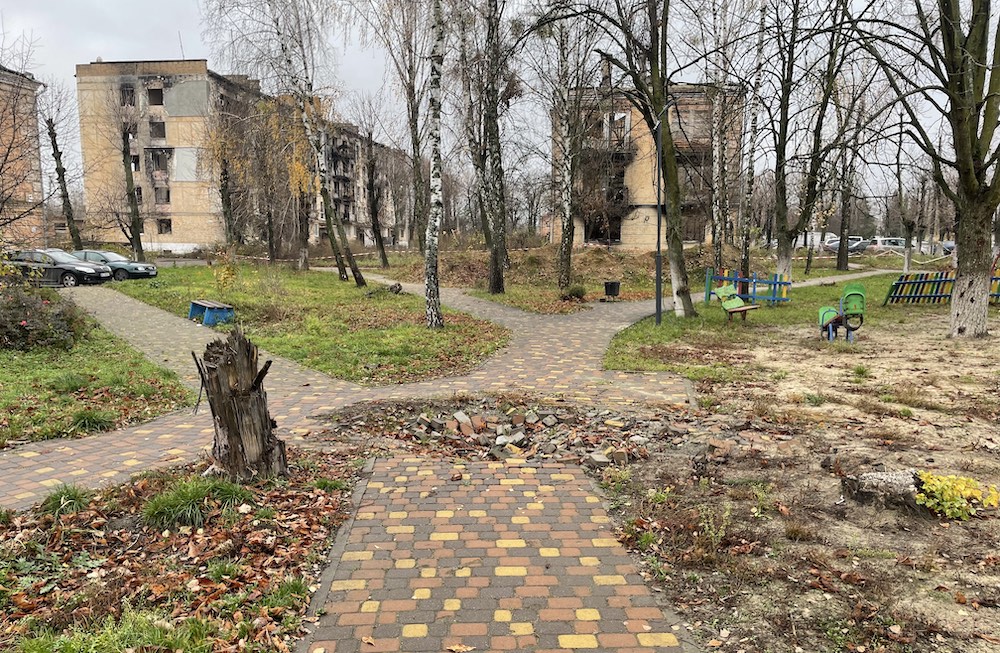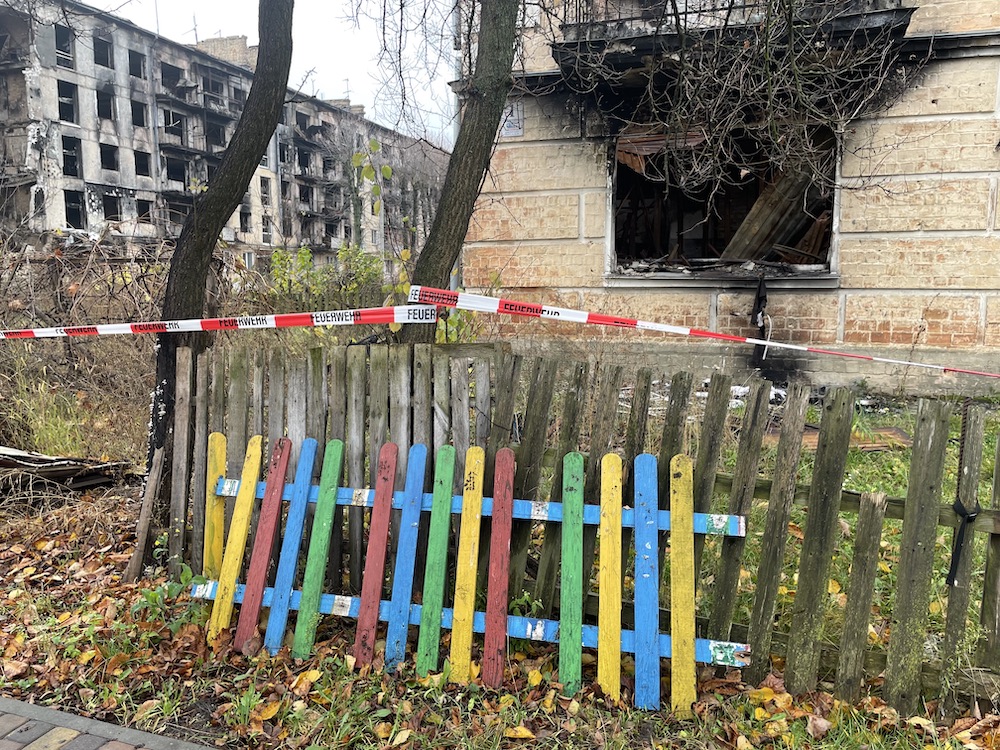“Don’t worry if you hear explosions,” says Oleksandr Mykhed. “They’re clearing mines here – we are in the process of derussification.” It is winter, and Mykhed is leading the way through his former hometown of Hostomel. He stops at the edge of a children’s playground: the metal of the swings, slides and seesaw is pockmarked, riddled with bullet holes and the traces of jagged shrapnel.
Until the all-out Russian invasion, on 24 February 2022, he was an art curator and literary critic as well as an author in his own right; now, he is standing by a metre-wide impact hole that cuts off the paved path through the playground. Behind it is a ghostly backdrop of burned-out buildings, their façades torn open, their windows gaping cavities: skeletons that look as if they have been turned violently inside out, revealing the debris and fragments of other people’s memories.
Shortly after fleeing to Chernivtsi in western Ukraine, Mykhed volunteered with the local territorial defence force and is currently [in November 2022, Note from the Editor] deployed in the Kyiv area. He wears functional, stone-grey clothing and cap, and rimless glasses that sometimes make his blue, intense eyes seem more prominent – as when he tries to describe events that are beyond the capacity of language to express.
“This war teaches us that even greater pain is always ahead,” he wrote in early April in a war diary published on the PEN Club Ukraine website. "How much grief can the human heart hold? The pain of Bucha is like no other. It is a torn piece of flesh. But torn from the heart.”
Now he says, “Despite everything, I still feel I can try to find the right words to talk about what we have experienced in Ukraine throughout these terrible months of the eight-year war.”
Documenting the violence in every possible way
Even though Mykhed has been personally affected by the atrocities in Hostomel, Irpin and Bucha, he still tries to maintain a scholarly distance. His essays, lectures and war diaries not only share his own story of loss but document those of other people too. Personal stories are absolutely essential when it comes to documenting the violence of the Russian occupiers, he says: “We have to document it with all the means at our disposal.”

His own story goes like this: in the early morning of 24 February, in a modern district of Hostomel surrounded by the pine forests that are typical of this area, Oleksandr Mykhed and his wife Olena are woken by the sound of explosions; at 8 a.m., several waves of helicopters pass overhead, very close to their house.
Interesting article?
It was made possible by Voxeurop’s community. High-quality reporting and translation comes at a cost. To continue producing independent journalism, we need your support.
“We could hear the roar of the helicopters and smell the smoke from the explosions,” Mykhed recalls. They decide to flee – but he is unable to persuade his parents, who live just ten minutes away in Bucha, to go with them: “I didn’t find the right words.” From the window they can see the Russian troops taking Bucha: the city will endure three weeks of Russian occupation.

“Bucha is an open wound. One of many – Mariupol, Izyum, Kherson – but it’s the one that has been most thoroughly documented and investigated,” he says, adding that this is why it is so important to go on talking about it: in order to get a sense of the scale and systematic nature of the Russian atrocities still being committed in the occupied territories. “For me personally, Bucha will always be a shadow that settled on my family.”
Hostomel in ruins
Now Mykhed stands in front of what remains of his house, trying to explain why the Russian troops chose this particular area to begin their rampage: “They were expecting to find poor villages but some of these places and houses are wealthy. What they couldn’t take with them, they destroyed.” Of the townhouse where he lived peacefully with his wife and dog for four years, little remains but a blackened shell.
He moves through the landscapes of the Russian crimes, not just as an author and soldier, but as a former resident too. “It’s all in the blood – it’s all in the memory,” he says. Like the neighbouring town of Irpin, Hostomel was attacked from the air; following its liberation by the Ukrainian army in early April, half of it now lies in ruins.
Mykhed is haunted by the brutality with which Russia is waging war not only against the Ukrainian people, but also against cultural symbols. “The Ukrainian language reacted immediately: it remembers the events, describes them – and in so doing, creates a new basis for remembering,” he says.
In the new Ukrainian reality, he is preoccupied with the ways in which war influences language, constantly giving rise to new symbols and images that are heavy with meaning, either militant or subversive.

“It is a new reality with many new symbols,” he says in an online lecture on “The Language of War”, part of his virtual residency with the University of Oxford’s Department of Medieval and Modern Languages, adding that the changes have been necessary in order to make it possible to speak about what is really happening to the Ukrainian people, “what Russia is really doing to us”.
Virgin Mary meme
The military aspect of the new Ukrainian discourse is much in evidence: the Bayraktar unmanned aerial vehicle, for instance, has been adopted as a unifying symbol. The same goes for St. Javelin: an icon-style image of the Virgin Mary as protector of Ukraine, armed with the Javelin anti-tank weapon, which has become a meme. Mykhed says the image has been extremely helpful to Ukraine and that a fundraising initiative that referenced it has raised a great deal of money. “Our defence minister has one printed on his t-shirt, and it has found its way into urban murals too.” Ukrainian has also come up with its own names for the Iranian Shahed-2 drones that are being actively deployed by the Russian forces: “scooters” or “flying balalaikas”.
Among the survival strategies that have emerged in the reality of war in Ukraine are the iconic pyramids of cellophane-covered sandbags that have been built around the statues in city squares, strange symbols with a universal meaning: that which is threatened, is protected; that which has been lost – whether for ever or just for now – is honoured.
Mykhed sees his writing as part of a comprehensive project of documentation and remembrance that needs to be carried out by Ukrainians, but not by Ukrainians alone. Both personal and collective traumas need to be processed, after all – and Russian war crimes must be tried in a criminal court.
“Essays give me the opportunity to speak in an art form: it’s like a documentary film that you can play inside the reader’s head. At the same time, the non-fiction genre gives me the freedom to talk about feelings as well as facts.”
When words reach their limit
But even the simple question “How are you?” (Yak ty?) can be an insurmountable barrier. Mykhed describes what many Ukrainians in exile in western Europe are currently feeling: “Within the framework of so-called intellectual discourse, it’s sometimes impossible to express ourselves.” He says a lot remains between the lines, unspoken: inexpressible pain, anger, desire for vengeance. Sometimes words simply reach their limit.
Diaries, chronicles, essays, non-fiction books: these are all tools for laying the foundation for collective remembering. “The more evidence we collect, the greater the hope that Russizm will never win – and that the Russian-Soviet empire will finally break apart.”

Mykhed says it is their daily duty, their destiny, to bear witness: “It will take decades, of course.” At the same time, Ukrainians are far too interesting to be nothing more than witnesses: “We have a rich history and culture, a great sense of humour – and we deserve to be in the spotlight in our own right, not just in the context of the Russian-Ukraine war and its discourse.”
Oleksandr Mykhed’s latest book, I Will Mix Your Blood With Coal (Nash Format) was longlisted for the BBC Ukraine Book of the Year Award 2020, as well as for the Yurii Shevelov Prize.












